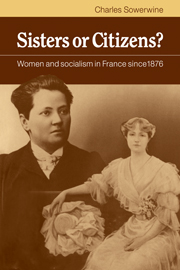Book contents
- Frontmatter
- Contents
- Preface
- Abbreviations of organisations
- Bibliographical abbreviations
- Introduction
- Part I Feminism and socialism 1876–1900
- 1 Women and the beginnings of the socialist movement 1876–82
- 2 Socialist parties in search of women 1882–99
- 3 Feminists in search of a mass base: the rise and fall of social feminism 1889–1900
- Part II Origins of the socialist women's movement 1899–1914
- Part III Development and decline of the socialist women's movement 1914–79
- Conclusion
- Appendix 1 The Second International and the woman question 1889–1904
- Appendix 2 French socialist women in figures
- Appendix 3 Elisabeth Renaud and the Cambier affair
- Notes
- Bibliography
- Index
2 - Socialist parties in search of women 1882–99
Published online by Cambridge University Press: 07 October 2011
- Frontmatter
- Contents
- Preface
- Abbreviations of organisations
- Bibliographical abbreviations
- Introduction
- Part I Feminism and socialism 1876–1900
- 1 Women and the beginnings of the socialist movement 1876–82
- 2 Socialist parties in search of women 1882–99
- 3 Feminists in search of a mass base: the rise and fall of social feminism 1889–1900
- Part II Origins of the socialist women's movement 1899–1914
- Part III Development and decline of the socialist women's movement 1914–79
- Conclusion
- Appendix 1 The Second International and the woman question 1889–1904
- Appendix 2 French socialist women in figures
- Appendix 3 Elisabeth Renaud and the Cambier affair
- Notes
- Bibliography
- Index
Summary
The schism of 1882 inaugurated an era of sectarian competition between the Broussists and the Guesdists, competition so intense that the French embarrassed international socialism by holding rival congresses to found the Second International at Paris in 1889. At the same time, still more socialist parties were emerging. In 1889, the Comité Révolutionnaire Central (CRC) came under the leadership of Edouard Vaillant and began to emerge as a socialist party in its own right. In 1890, the Broussist FTSF split in two, leading to the creation of Jean Allemane's Parti Ouvrier Socialiste Revolutionnaire (POSR). Finally, during the 1890s, the socialists who considered themselves ‘independent’ of the organised parties became an important current and began to form their own party, under the inspiration of Jean Jaurès.
The sectarianism of the 1880s nevertheless prepared the basis for socialist success. In the first place, the sectarian parties clearly distinguished socialism from republicanism, even radical republicanism, by virtue of their distinct organisation, working-class orientation, and insistence on public ownership of the means of production. In the second place, the socialist sects organised at the local level, trained militants and diffused propaganda. These pure and untainted little parties had the advantages of faith and enthusiasm. They spread the socialist message throughout the country, which paid off in the 1890s.
The industrialisation of France, in full swing since the Second Empire, was gradually swelling the ranks of propertyless workers who could find a more relevant approach to their problems in socialist analysis than in that of the radical republicans.
- Type
- Chapter
- Information
- Sisters or Citizens?Women and Socialism in France since 1876, pp. 48 - 66Publisher: Cambridge University PressPrint publication year: 1982



